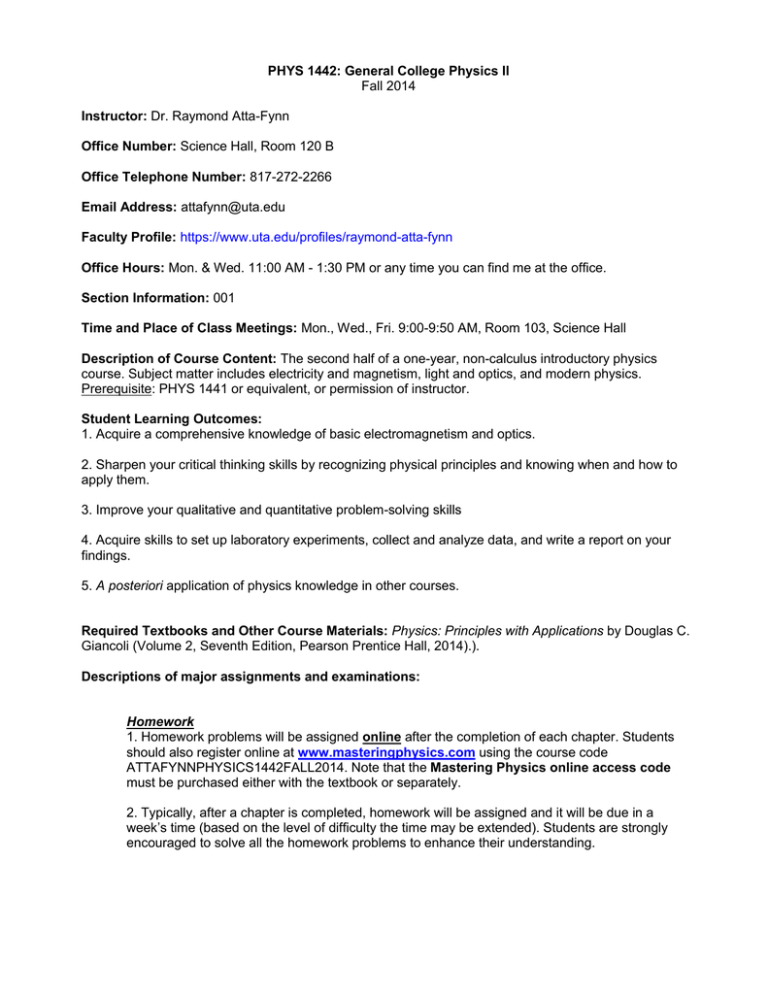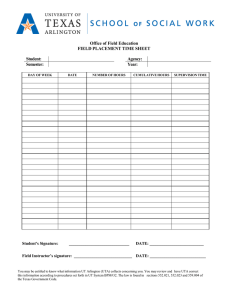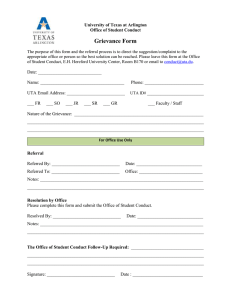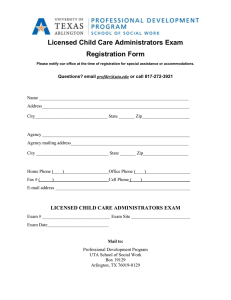
PHYS 1442: General College Physics II
Fall 2014
Instructor: Dr. Raymond Atta-Fynn
Office Number: Science Hall, Room 120 B
Office Telephone Number: 817-272-2266
Email Address: attafynn@uta.edu
Faculty Profile: https://www.uta.edu/profiles/raymond-atta-fynn
Office Hours: Mon. & Wed. 11:00 AM - 1:30 PM or any time you can find me at the office.
Section Information: 001
Time and Place of Class Meetings: Mon., Wed., Fri. 9:00-9:50 AM, Room 103, Science Hall
Description of Course Content: The second half of a one-year, non-calculus introductory physics
course. Subject matter includes electricity and magnetism, light and optics, and modern physics.
Prerequisite: PHYS 1441 or equivalent, or permission of instructor.
Student Learning Outcomes:
1. Acquire a comprehensive knowledge of basic electromagnetism and optics.
2. Sharpen your critical thinking skills by recognizing physical principles and knowing when and how to
apply them.
3. Improve your qualitative and quantitative problem-solving skills
4. Acquire skills to set up laboratory experiments, collect and analyze data, and write a report on your
findings.
5. A posteriori application of physics knowledge in other courses.
Required Textbooks and Other Course Materials: Physics: Principles with Applications by Douglas C.
Giancoli (Volume 2, Seventh Edition, Pearson Prentice Hall, 2014).).
Descriptions of major assignments and examinations:
Homework
1. Homework problems will be assigned online after the completion of each chapter. Students
should also register online at www.masteringphysics.com using the course code
ATTAFYNNPHYSICS1442FALL2014. Note that the Mastering Physics online access code
must be purchased either with the textbook or separately.
2. Typically, after a chapter is completed, homework will be assigned and it will be due in a
week’s time (based on the level of difficulty the time may be extended). Students are strongly
encouraged to solve all the homework problems to enhance their understanding.
Exams
1. There will two midterm exams and a final exam.
2. Exams will comprise multiple choice problems, with about 40% of the questions being of a
qualitative nature and 60% being quantitative. Partial credit can be earned on incorrect
quantitative problems by showing your work.
3. Each exam will be non-comprehensive. To be more specific, Midterm exam 1 will be based on
course material covered from the first day of class to the last class before the exam; Midterm
exam 2 will be based on course material covered between Midterm exam 1 and the last class
before the exam; the final exams will be based on the material covered between Midterm exam 2
and the last day of class.
4. The practice problems and solutions on the course webpage should be sufficient for your exam
preparation. I will also give you some information in class on what to expect on each exam.
5. A formula sheet will be provided for each exam.
Assistance Outside the classroom
1. I will provide assistance to those who need help with any aspect of the course work.
2. Students should also utilize a free homework assistance clinic provided by the Physics
department. Information on this service can be obtained from
http://www.uta.edu/physics/main/resources/clinics/index.html.
Attendance: Students are expected to attend classes regularly. There will be exercises/quizzes for each
class. The extra credit earned from the in-class exercises/quizzes will count toward your final grade.
Grading:
Activity
Percentage
Lab.
10%
Homework
25%
Exam 1
15%
Exam 2
15%
Exam 3
15%
Final Exam
20%
Total
100%
Extra Credit (Classroom Exercises & Quizzes)
6%
Scale (tentative)*
90-100 A
80-89 B
70-79 C
50-69 D
0-49 F
*As the instructor for this course, I reserve the right to adjust the grading scale.
Also, a Lab. grade of F implies an automatic F in the course –Dr. Raymond
Atta-Fynn.
Exam dates (tentative)
Exam 1
Monday, September 15
Exam 2
Wednesday, October 8
Exam 3
Friday, October 31
Final Exam
Wednesday, December 10, 8-10:20 AM
Other important dates
Labor Day Holiday
Monday, September 1
Census date
Monday, September 8
Last day to drop classes; submit
requests to advisor prior to 4:00pm
Wednesday, October 29
Thanksgiving Holidays
Thursday, Friday November 27-28
Last day of class
Wednesday, December 3
Make-up Exams: If you miss a test without an official documented reason, a make-up may be taken if
you inform me the day prior to the test. The make-up test must be taken within one week after the test
date.
Drop Policy: Students may drop or swap (adding and dropping a class concurrently) classes through
self-service in MyMav from the beginning of the registration period through the late registration period.
After the late registration period, students must see their academic advisor to drop a class or withdraw.
Undeclared students must see an advisor in the University Advising Center. Drops can continue through
a point two-thirds of the way through the term or session. It is the student's responsibility to officially
withdraw if they do not plan to attend after registering. Students will not be automatically dropped for
non-attendance. Repayment of certain types of financial aid administered through the University may be
required as the result of dropping classes or withdrawing. For more information, contact the Office of
Financial Aid and Scholarships (http://wweb.uta.edu/aao/fao/).
Americans with Disabilities Act: The University of Texas at Arlington is on record as being committed
to both the spirit and letter of all federal equal opportunity legislation, including the Americans with
Disabilities Act (ADA). All instructors at UT Arlington are required by law to provide "reasonable
accommodations" to students with disabilities, so as not to discriminate on the basis of that disability. Any
student requiring an accommodation for this course must provide the instructor with official
documentation in the form of a letter certified by the staff in the Office for Students with Disabilities,
University Hall 102. Only those students who have officially documented a need for an accommodation
will have their request honored. Information regarding diagnostic criteria and policies for obtaining
disability-based academic accommodations can be found at www.uta.edu/disability or by calling the
Office for Students with Disabilities at (817) 272-3364.
Title IX: The University of Texas at Arlington is committed to upholding U.S. Federal Law “Title IX” such
that no member of the UT Arlington community shall, on the basis of sex, be excluded from participation
in, be denied the benefits of, or be subjected to discrimination under any education program or activity.
For more information, visit www.uta.edu/titleIX.
Academic Integrity: Students enrolled all UT Arlington courses are expected to adhere to the UT
Arlington Honor Code:
I pledge, on my honor, to uphold UT Arlington’s tradition of academic integrity, a tradition that
values hard work and honest effort in the pursuit of academic excellence.
I promise that I will submit only work that I personally create or contribute to group
collaborations, and I will appropriately reference any work from other sources. I will follow the
highest standards of integrity and uphold the spirit of the Honor Code.
UT Arlington faculty members may employ the Honor Code as they see fit in their courses, including (but
not limited to) having students acknowledge the honor code as part of an examination or requiring
students to incorporate the honor code into any work submitted. Per UT System Regents’ Rule 50101,
§2.2, suspected violations of university’s standards for academic integrity (including the Honor Code) will
be referred to the Office of Student Conduct. Violators will be disciplined in accordance with University
policy, which may result in the student’s suspension or expulsion from the University.
Lab Safety Training:
Students registered for this course must complete all required lab safety training prior to entering
the lab and undertaking any activities. Once completed, Lab Safety Training is valid for the remainder
of the same academic year (i.e., through the following August) and must be completed anew in
subsequent years. There are no exceptions to this University policy. Failure to complete the required
training will preclude participation in any lab activities, including those for which a grade is assigned.
Electronic Communication: UT Arlington has adopted MavMail as its official means to communicate
with students about important deadlines and events, as well as to transact university-related business
regarding financial aid, tuition, grades, graduation, etc. All students are assigned a MavMail account and
are responsible for checking the inbox regularly. There is no additional charge to students for using this
account, which remains active even after graduation. Information about activating and using MavMail is
available at http://www.uta.edu/oit/cs/email/mavmail.php.
Student Feedback Survey: At the end of each term, students enrolled in classes categorized as
“lecture,” “seminar,” or “laboratory” shall be directed to complete an online Student Feedback Survey
(SFS). Instructions on how to access the SFS for this course will be sent directly to each student through
MavMail approximately 10 days before the end of the term. Each student’s feedback enters the SFS
database anonymously and is aggregated with that of other students enrolled in the course. UT
Arlington’s effort to solicit, gather, tabulate, and publish student feedback is required by state law;
students are strongly urged to participate. For more information, visit http://www.uta.edu/sfs.
Final Review Week: A period of five class days prior to the first day of final examinations in the long
sessions shall be designated as Final Review Week. The purpose of this week is to allow students
sufficient time to prepare for final examinations. During this week, there shall be no scheduled activities
such as required field trips or performances; and no instructor shall assign any themes, research
problems or exercises of similar scope that have a completion date during or following this week unless
specified in the class syllabus. During Final Review Week, an instructor shall not give any examinations
constituting 10% or more of the final grade, except makeup tests and laboratory examinations. In addition,
no instructor shall give any portion of the final examination during Final Review Week. During this week,
classes are held as scheduled. In addition, instructors are not required to limit content to topics that have
been previously covered; they may introduce new concepts as appropriate.
Emergency Exit Procedures: Should we experience an emergency event that requires us to vacate the
building, students should exit the room and move toward the nearest exit, which is located close to the
classroom. When exiting the building during an emergency, one should never take an elevator but should
use the stairwells. Faculty members and instructional staff will assist students in selecting the safest
route for evacuation and will make arrangements to assist individuals with disabilities.
Student Support Services: UT Arlington provides a variety of resources and programs designed to help
students develop academic skills, deal with personal situations, and better understand concepts and
information related to their courses. Resources include tutoring, major-based learning centers,
developmental education, advising and mentoring, personal counseling, and federally funded programs.
For individualized referrals, students may visit the reception desk at University College (Ransom Hall),
call the Maverick Resource Hotline at 817-272-6107, send a message to resources@uta.edu, or view the
information at www.uta.edu/resources.
Course Schedule
Chapter 16: Electric Charge and Electric Field
Chapter 17: Electric Potential
Chapter 18: Electric Currents
Chapter 19: DC Circuits
Chapter 20: Magnetism
Chapter 21: Electromagnetic Induction and Faraday’s Law
Chapter 22: Electromagnetic Waves
Chapter 23: Light: Geometric Optics
Chapter 24: The Wave Nature of Light
Chapter 25: Optical Instruments
Chapter 26: The Special Theory of Relativity
Chapter 27: Early Quantum Theory and Models of the Atom
Chapter 28: Quantum Mechanics of Atoms
Chapter 29: Molecules and Solids
Chapter 30: Nuclear Physics and Radioactivity
Chapter 31: Nuclear Energy; Effects and Uses of Radiation
Chapter 32: Elementary Particles
Chapter 33: Astrophysics and Cosmology
Emergency Phone Numbers: In case of an on-campus emergency, call the UT Arlington Police
Department at 817-272-3003 (non-campus phone), 2-3003 (campus phone). You may also dial 911. For
non-emergencies, contact the UTA PD at 817-272-3381.
Library Information and Resources:
Library Home Page ....................................... http://www.uta.edu/library
Subject Guides .............................................. http://libguides.uta.edu
Subject Librarians.......................................... http://www.uta.edu/library/help/subject-librarians.php
Database List ................................................ http://www.uta.edu/library/databases/index.php
Course Reserves........................................... http://pulse.uta.edu/vwebv/enterCourseReserve.do
Library Tutorials ............................................ http://www.uta.edu/library/help/tutorials.php
Connecting from Off- Campus ...................... http://libguides.uta.edu/offcampus
Ask A Librarian .............................................. http://ask.uta.edu
The following URL houses a page where we have gathered many commonly used resources needed by
students in online courses: http://www.uta.edu/library/services/distance.php.
The subject librarian for your area can work with you to build a customized course page to support your class if
you wish. For examples, visit http://libguides.uta.edu/os and http://libguides.uta.edu/pols2311fm . If you have
any questions, please feel free to contact Suzanne Beckett, at sbeckett@uta.edu or at 817.272.0923.



